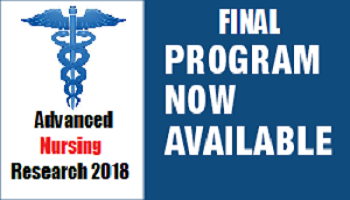
Patricia K Amado
University of Miami, USA
Title: The lived experience of women with breast cancer in the surveillance phase of recovery: a liminal process to healing
Biography
Biography: Patricia K Amado
Abstract
Background: The use of language to create meaning is a way that human beings can make sense of their reality. The diagnosis of cancer is an earth shaking event and trying to make sense of it is a huge driving force in coping with this insidious disease. The use of writing and sharing stories gives insight. In order for healthcare givers to stay focused on the patient, a holistic approach needs to be incorporated in the nurse’s plan of care for the cancer patient. The importance is in treating body, mind, and soul. The National Cancer Institute ([NCI], 2012); Breast cancer leading cancer in women ages 25-70; ([ACS], 2012) 2.9 million breast cancer survivors in the US Grant, Economou & Ferrell (2010) 30% of all new cancers are breast cancer IOM ( 2006) study report focus on survivorship clinics.
Research Design: The use of a qualitative design with a hermeneutic phenomenological approach will be followed to study the lived experience of women living with breast cancer. The study will utilize van Manen’s hermeneutic phenomenological approach in exploring the lived experience, which focuses on a unique view into each human experience through the examination of language to gain knowledge from textual discourse and reflection and conversational interviews. Van Manen’s six research activities will guide the interpretation of the findings. Qualitative researchers postulate that research cannot be seen objectively from the outside.
Results: Five of the 25 participants in this study discussed positive outcomes as a result of their experience with breast cancer. This study suggests that self enhancement or an overly positive bias about oneself is a liminal pathway to resiliency when experiencing illness stress. This study highlighted the need for understanding the role of resiliency and facing illness. Creation of a concept analysis specific to survivorship nurses have an important role on the medical advice and can have a direct impact on how the patient understands the disease process.
Strengths & Limitations: This study provided insight into the participants’ lived experiences of the way women adapt by the use of narrative discourse to heal. The findings of this research study are limited by the possible homogeneous demographic characteristics of the research participants such as the locale of the study. A different socioeconomic area may warrant different results. The need to explore younger survivors could be a premise for further research on this topic.
Implications for Future Research: Gaining a deeper understanding from the women’s illness narratives is a progressive and creative method in exploring their lived experience. This study will stimulate thought provoking dialogue in nursing circles about innovative paths about illness, health, and healing throughout the trajectory of living breast cancer.

